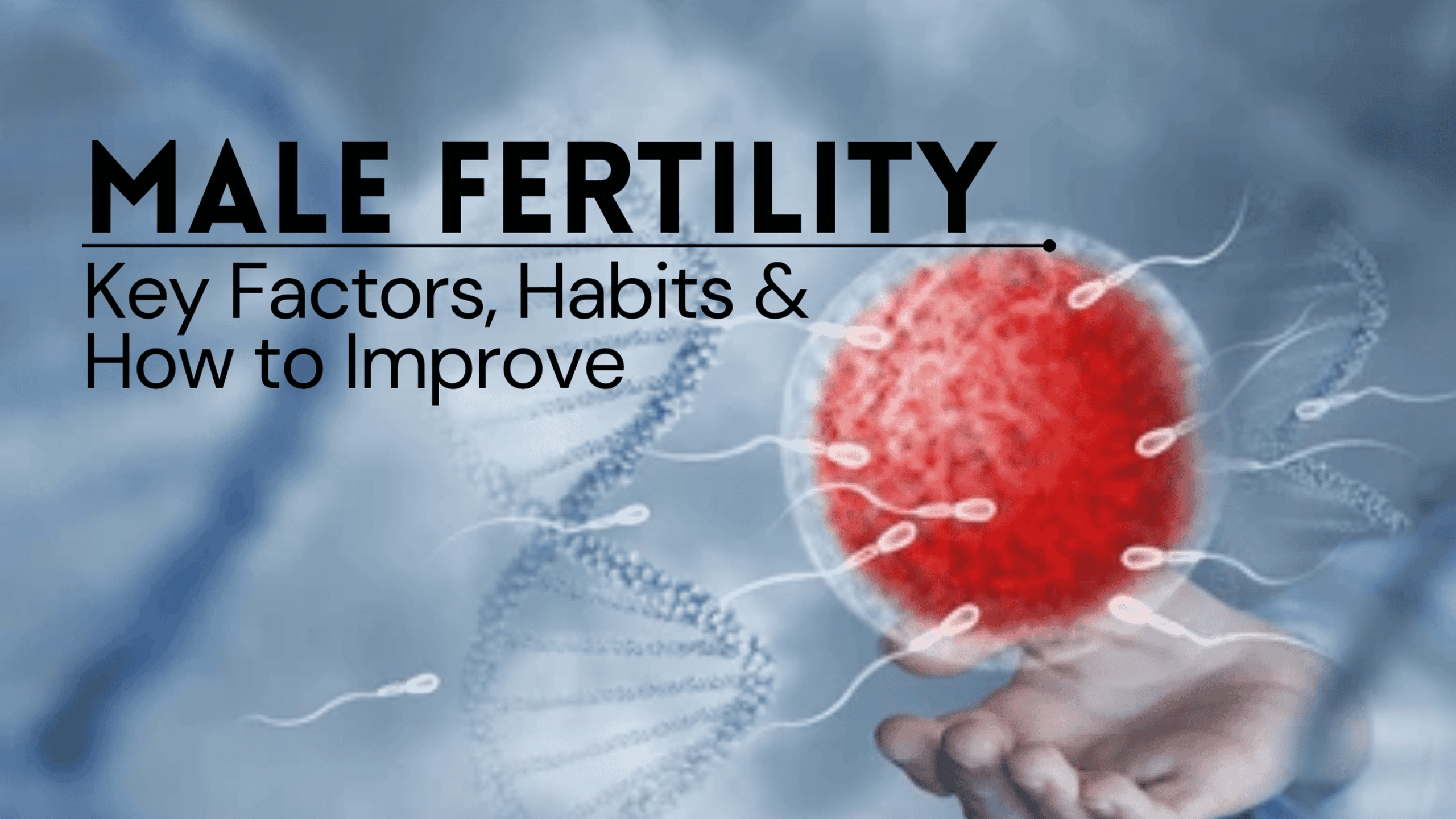Male fertility is equally as essential for the process of pregnancy as female fertility, although the fact that it is frequently perceived as a female health concern. In fact, 40–50% of all cases of infertility are caused by male factors. The chances of conception can be significantly increased for men who want to start a family planning program or just improve their reproductive health by knowing the main factors that affect fertility and altering their lifestyle.
Male fertility issues are largely diagnosed and treated by urologists, specialists in the male reproductive system and urinary tract. The key elements of male fertility, typical reasons for infertility, lifestyle choices that affect sperm health, and evidence-based methods to increase fertility frequency under a urologist’s supervision are all covered in this material.
What Is Male Fertility?
Male fertility is defined as a man’s ability to become a father. The quantity and quality of sperm, their ability to move efficiently (motility), and structural elements like the reproductive path’s structure all play a role in this. For egg fertilisation to be successful, there must be a sufficient quantity of motile sperm in the semen.
A simple semen analysis assesses:
- The quantity of sperm in one millilitre of semen is known as the sperm count.
- The percentage of sperm that can travel effectively is known as motility.
- Morphology: The structure and form of sperm.
- Volume: The quantity of semen generated.
- The proportion of living sperm is known as vitality.
Key Factors That Affect Male Fertility
Many biological and environmental elements can affect male fertility. Urologists commonly these key factors:
1. Hormonal Imbalances
Sperm generation is significantly influenced by testosterone as well as other hormones like luteinizing hormone (LH) and follicle-stimulating hormone (FSH). Spermatogenesis may be hampered by unbalanced sperm.
2. Varicocele
An enlargement of the scrotal veins known as a varicocele can increase testicular warmth while lowering the quantity and quality of sperm. It is among the main causes of infertility in men.
3. Infections
Sperm production or sperm track obstruction can be caused by sexually transmitted infections (STIs), prostatitis, or illnesses in the reproductive system.
4. Genetic Conditions
Testicular function and sperm production can be impacted by chromosomal diseases like Klinefelter syndrome or by gene additions and deletions on the Y chromosome.
5. Obstructions
Sperm can’t be ejaculated if the vas deferens or epididymis are blocked.
6. Drugs and Medical Interventions
Fertility may be hampered by some drugs, such as anabolic steroids, chemotherapy, and testosterone supplements. Risks may also arise from radiation therapy and procedures performed near reproductive organs.
7. Age
Although it is technically possible for men to become fathers later in life, testosterone levels and sperm quality often decline around the age of forty.
Lifestyle Habits That Impact Fertility
Routine habits can either help or impede conception, according to urologists. Among the most significant elements are:
1. Tobacco use and smoking
Smoking lowers sperm motility and count and may affect sperm DNA.
2. Drinking Alcohol
Excessive alcohol use lowers testosterone levels and inhibits sperm formation. For those who are attempting to conceive, moderate to no alcohol is advised.
3. Being overweight
Hormonal abnormalities, elevated scrotal temperature, and worse sperm parameters can result from having too much body fat.
4. Exposure to Heat
Using saunas, hot tubs or even tight pants frequently might increase scrotal temperature and decrease sperm production.
5. Nutrition
A diet high in processed foods, sugar, and trans fats is linked to lower sperm quality. Antioxidant-rich diets improve reproductive outcomes.
6. Insufficient Exercise
Fertility is adversely affected by obesity and poor circulation, both of which are caused by sedentary behaviour.
7. Stress
Prolonged stress affects hormone levels and can harm sperm health and libido.
How Urologists Help with Male Fertility
Male infertility can be assessed and treated by urologists who specialise in andrology or reproductive urology using a multifaceted strategy:
Diagnostic Examination:
- Analysis of semen
- Profiling hormones
- Ultrasonography of the scrotum
- Genetic analysis
- Testicular biopsies (rarely)
Treatments:
- Medical therapy: Medication or hormonal therapies to increase sperm production.
- Surgical intervention: removal of sperm, repair of varicocele, or removal of anatomical obstructions.
- Working together with fertility clinics to perform IUI or IVF treatments is known as assisted reproductive techniques, or ART.
How to Improve Male Fertility: Evidence-Based Tips
If you are trying to improve fertility naturally or before seeing a specialist, start with these proven changes:
1. Eat Fertility-Boosting Foods
Include foods high in:
- Zinc contains food such as pumpkin seeds, oysters
- Vitamin C is the best for improving fertility in your diet inclde citrus fruits, bell pepper.
- If you are not eating leafy green and legumes veggies you should start folate food
- Salmon is a high-quality protein source that contains essential B vitamins that support brain health and the immune system.
- Coenzyme Q10 and SeleniumThis combination has been shown to improve systemic redox status, increase fertility potentially and improve mitochondrial function
2. Exercise Regularly (But Not Excessively)
Circulation and hormone levels are improved by moderate exercise. On the other hand, excessive riding or overtraining can have the opposite impact.
3. Keep Your Weight in Check
In obese people, even a 10% weight loss can increase sperm and testosterone production.
4. Reduce Chemicals and Toxins
Steer clear of industrial pollutants, insecticides, heavy metals, and plastics that contain BPA.
5. Reduce Alcohol and Give Up Smoking
Two of the most effective lifestyle adjustments that greatly enhance semen parameters are these two.
6. Control Your Stress
Proper sleep hygiene, therapy, and meditation can all have a favourable impact on libido and hormone control.
7. Take Supplements into Account
The usage of supplements such as L-carnitine is supported by certain studies.
- Zinc and vitamin E
- CoQ10 and ashwagandha
- Before beginning a supplement regimen, always get advice from a urologist or healthcare professional.
When to See a Urologist
- If a man has been trying to conceive for more than 12 months without success (or 6 months if the female spouse is above 35), he might think about seeing a urologist.
- They have experienced testicular injuries, mumps, operations, or undescended testicles in the past.
- Low libido, erectile dysfunction, or scrotal soreness or swelling are some of their symptoms.
- They have been exposed to radiation, anabolic steroids, chemotherapy, and other fertility-risk factors.
- There is a reported abnormal semen analysis.
Conclusion
Numerous biological, lifestyle, and environmental factors affect male fertility. Fortunately, with the correct knowledge and proactive medical care, many of these can be changed. Providing both medical and surgical options, urologists are essential in the diagnosis and treatment of male infertility. Don’t be afraid to get treatment if you’re having trouble getting pregnant or want to improve your reproductive health; early intervention frequently produces better results.
You can greatly increase your chances of becoming pregnant and your general well-being by making minor but steady adjustments to your daily schedule and health practices.


